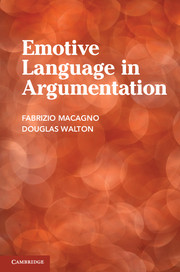2 - The Emotions in Our Words
Published online by Cambridge University Press: 05 June 2014
Summary
Some words have a particular force. Terms such as ‘war,’ ‘peace,’ ‘security,’ or ‘terrorism’ trigger emotions. They lead us to appreciate, hate, fear, or reject a state of affairs. These terms are instruments for influencing affections and choices. In this sense, words are emotive. Stevenson (1944) pointed out how this power of words can be considered as a dimension of meaning, the disposition of a word to change a hearer’s attitudes and emotional reactions instead of altering his structure of beliefs. In the first chapter we showed how emotive words can be used to hide and distort reality. However, the crucial issue to be considered in order to explain such a power of words is to understand what emotive meaning is, and how it affects our feelings, attitudes, and decisions. Where is such meaning? Why is it a characteristic of some words only? Do ethical terms trigger the same emotions in any culture, or is the emotive meaning dependent upon context and knowledge? Is emotive meaning rational?
The starting point for our investigation is a quotation from Huxley’s Brave New World. In this fantastic and metaphorical world, children were produced in laboratories, and the notion of family disappeared. Reality had been drastically modified and the laws of nature completely subverted. In this world, however, words acquired new meanings, and in particular new emotive meanings (Huxley 1998: 22–23):
“And ‘parent’?” questioned the D.H.C.
There was an uneasy silence. Several of the boys blushed. They had not yet learned to draw the significant but often very fine distinction between smut and pure science. One, at last, had the courage to raise a hand.
“Human beings used to be … ” he hesitated; the blood rushed to his cheeks. “Well, they used to be viviparous.”
“Quite right.” The Director nodded approvingly.
“And when the babies were decanted … ”
“’Born,’” came the correction.
“Well, then they were the parents – I mean, not the babies, of course; the other ones.” The poor boy was overwhelmed with confusion.
“In brief,” the Director summed up, “the parents were the father and the mother.” The smut that was really science fell with a crash into the boys’ eye-avoiding silence. “Mother,” he repeated loudly rubbing in the science; and, leaning back in his chair, “These,” he said gravely, “are unpleasant facts; I know it. But then most historical facts are unpleasant.”
- Type
- Chapter
- Information
- Emotive Language in Argumentation , pp. 30 - 68Publisher: Cambridge University PressPrint publication year: 2014



